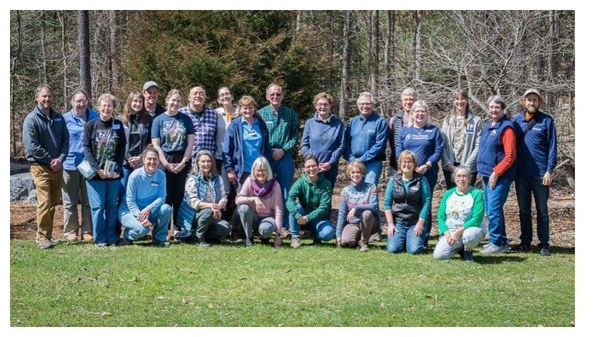The Penn State Extension Master Gardener volunteer program supports the outreach mission of Penn State Extension by utilizing unbiased research-based information to educate the public and our communities on best practices in sustainable horticulture and environmental stewardship.

Gloved hands holding beets. Photo Credit: Adobe Stock
2024 Year in Review
Greetings from the Penn State Extension Master Gardener Program!
Despite research showing that volunteerism is decreasing nationwide*, our program continues to grow and thrive. In 2024, our volunteers served a record-breaking 240,140 hours—almost 20,000 hours above our previous record set in 2019. "Thank you" hardly feels like enough to show our appreciation for everyone who supports our work. We hope the stories and impacts in this year's report bring you not only joy but also gratification that your contributions—whether they are in time, talent, or funds—are making a measurable difference in Pennsylvania.
In sweet gratitude,
Erin Kinley
Senior Extension Program Manager
State Master Gardener Coordinator
*Poon L. 2024. "Americans are volunteering less than ever." Bloomberg (January 15).
2024 by the Numbers
Enrollment
- 3,743 active volunteers
- Including 486 trainees
- 240,140 volunteer hours reported
- Valued at $7.51 million†
- 9% increase from 2023
Public Outreach and Education
- 1,839 presentations for the public
- 670 articles written and published
- 695 educational displays and booths at public events
- 245 educational demonstration gardens totaling 20.3 acres
- 358 news articles, radio spots, TV interviews, and podcast episodes featuring volunteers and their projects
- 103,113 social media followers and members
Partnerships
Master Gardeners provided educational programming and support at:
- 119 community gardens
- 349 K–12 schools
- 112 youth camps
- 178 libraries
- 696 community organizations
Spotted Lanternfly
Public education about this invasive pest was given through:
- 62 presentations and webinars for the public
- 631 outreach displays
Donations
County programs gave:
- 27,300 pounds of produce to local food banks and other nonprofit organizations
- 48,563 seed packets and 10,509 plants to other organizations, community groups, and the public
†Independent Sector. 2024. “Value of volunteer time report: independent sector resource.” Independent Sector (April 29).
2024 Economic Impact
The Penn State Extension Master Gardener Program strives to be more than a good steward of taxpayer dollars and, in fact, provides a return on investment. The Independent Sector currently estimates that 1 hour of volunteer time is worth $31.30 in Pennsylvania. This number is an average of what it would cost an organization to hire or contract staff to complete the same work. Volunteers contributed 240,140 hours this year for a value of over $7.5 million—more than three times our entire salary and wage budget.
Furthermore, all of our program materials are paid by cost-recovery and fundraised dollars via plant sales, publication sales, class registration fees, direct donations, and more. These funds are also used to offer programs like Seed to Supper at no cost to individuals with limited resources.
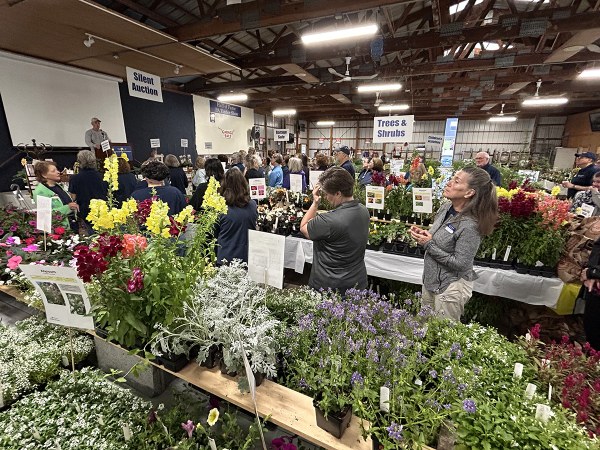
Many programs host annual plant sales to both educate the public on smart gardening choices and raise funds for outreach projects. Photo credit: Andy Faust
Poison Prevention Program
The Penn State Extension Master Gardener Program continues its successful collaboration with Penn State Extension's Pesticide Education Program to deliver poison prevention education to first-grade students across the commonwealth. This program year, volunteers educated 26,007 students in 378 schools in 48 counties across the state, a 44% increase in students compared with the previous year. Volunteers delivered targeted 30-minute lessons that educated first-grade students about pests, integrated pest management, poison safety, and critical hazard identification through signal-word recognition. Master Gardeners emphasized the importance of using the "Mr. Yuk" symbol to alert everyone in the home about dangerous products and to promote overall safety. Each lesson included a parent packet, offered in English and Spanish, for students to take home to share with their families.
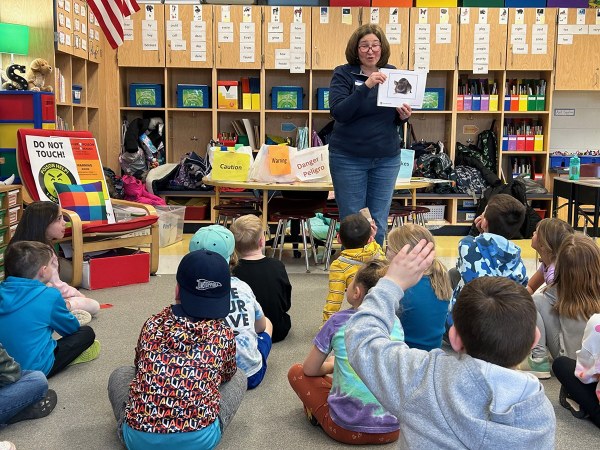
Master Gardener teaching first graders. Photo credit: Andy Faust
Poison Prevention Program Impacting Pennsylvania!
- 48 counties
- 378 schools
- 26,007 first-grade students
"This presentation is always excellent. The students are engaged and eager to learn from the Master Gardeners. It is an excellent presentation, organized, entertaining and very visual. Thank you! We would also like to think of ways to include the Master Gardeners in our science unit about plants and animals." —A first-grade teacher
2024 Master Gardener State Conference:
Rooted in Resilience Encouraging Change for the Future
The Penn State Extension Master Gardener Program hosted the Rooted in Resilience: Encouraging Change for the Future statewide conference June 9–11 in "Gem City," Erie, Pennsylvania. The conference is a biennial professional development opportunity for Master Gardeners, Master Gardener coordinators, and select community members. Participants explored cutting-edge horticultural topics, engaged with peers, and honored outstanding Master Gardener projects during the David Gibby Search for Excellence Awards Banquet, which recognizes exceptional community impact across Pennsylvania.
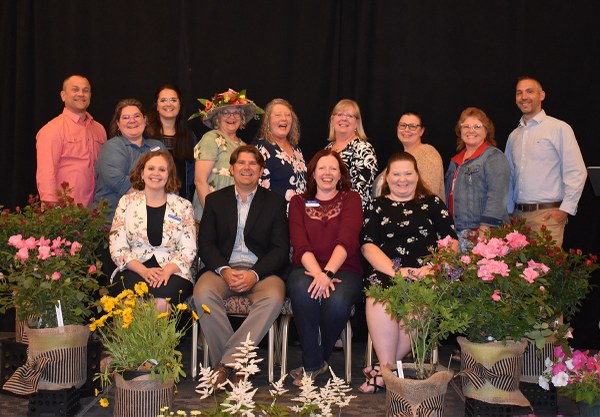
2024 State Conference committee members. Photo credit Suann Leighow
Over 200 participants gathered at the Ambassador Conference Center to take in the beauty of Erie, discover the wetland treasures of Presque Isle, and learn something new from the vast array of activities, including 6 tour and site opportunities, 5 keynotes, 12 breakout session presentations, a silent auction, and an exhibitor area. Some conference participants visited Ernst Seed, a leading agricultural research and production facility located in Meadville, Pennsylvania. Spanning over 10,000 acres of production, Ernst Seed cultivates a diverse offering of crops dedicated to critical environmental objectives, including conservation, ecological restoration, landscape beautification, energy production, and wildlife habitat preservation. Guests were guided through state-of-the-art climate-controlled storage facilities, precision packaging areas, specialized drying bins, and sophisticated seed sorting machinery.
| Speaker | Title | Presentation Title |
|---|---|---|
| Matt Rader | President, Pennsylvania Horticulture Society | The Power of Plants to Make a difference |
| Sophia Buggs | Operator, Lady Buggs Pharm Director Mahoning Food Access Executive Director of Plant It You | Growing Diverse Networks in Community Green spaces |
| Cathryn Pugh | Extension Educator | Riparian Buffers: Eat, Weave, and Conserve |
| Marena Powell-Toth, Kendal Kuhns | COO, Growing Together Aquaponics Education and Development Coordinator, Growing Together, Aquaponics | Growing Together: using adaptive Education to Grow Plants and People |
| Micelle Lee | Department of Entomology, Center for Pollinator Research | The Proof is in the Pollen: Using Plant DNA in Honey and Pollen to Understand Bee Foraging Choices |
| Glen Bupp | Extension Educator | Sustainable Lawn Management at Home |
| Tom Butzler | Extension Educator | Sweet Bounty: A Cross-County Honey Tasting Adventure |
| Remlee Peck | Master Gardener, Erie County | DIY Microgreens |
| Ruth Benner | Extension Educator | Navigating the Diagnostic Labyrinth in Plant Health - A Hands-on Workshop |
| Erin Kinley | State Master Gardener Coordinator | Serving Limited Resource Communities |
| Abra Lee | Horticulturalist, Historian, Author | Power to the Trees |
| Jamie Kopco | Extension Educator | Block the Biters: Mosquito Management |
| Mark Fiely | Horticulturalist, Ernst Seeds | Weeds of Meadows & their Control |
| Amber Stilwell | Extension Program Specialist | Inside the Choose Native Project |
| Kinorea Tigri, Fran Rosiak, Jill Baer | Master Gardener Coordinator, Master Gardener-Erie County, Master Gardener Coordinator | Roundtable Room: Youth Programming |
| Doug Oster | Media Personality | Making Horticulture Fun & Accessible |
| Daniel Foster | Associate Professor - Ag Economics Sociology and Education | Educating for Impact: Global Change Through Local Action |
The tour concluded with an educational visit to the expansive growing fields, offering insights into the company's innovative agricultural practices and environmental stewardship.
Other conference participants visited the Lake Erie Regional Grape Research and Extension Center. The facility produces 23 acres of Concord grapes, 5 acres of Niagara grapes, and a selection of other table and wine grapes. Staff at the center conduct experiments on disease and cultural practices that help growers make informed, scientifically based decisions. The day concluded with a guided tour of the South Shore Wine Company's historic 1860s stone wine cavern, showcasing traditional French winemaking preservation techniques.
The Tom Ridge Environmental Center and Presque Isle Tour were two other educational opportunities. Guests joined Pennsylvania Sea Grant, Penn State Extension, Department of Conservation and Natural Resources (DCNR), and other local partners for a tour of Presque Isle State Park, a unique 3,200-acre natural area and the many different forms of life that inhabit it. Participants became immersed in Presque Isle's hidden treasures through a wetland-focused aquatic invasive species program and an exploration of art and agroforestry near Lake Erie beaches. The tour concluded with a native plant walk through Presque Isle's trail system, providing a stroll through a system of sand dunes, wetland habitats, and beautiful scenery.
On the conference's second day, some guests chose to explore the Erie Zoo, a 15-acre zoological and botanical complex located in Glenwood Park. The tour showcased the facility's extensive collection of more than 400 animals and an impressive botanical garden featuring over 600 plant species from diverse global ecosystems. The tour provided conference attendees with a unique opportunity to experience the zoo's rich biodiversity, highlighting its commitment to wildlife conservation, environmental education, and international botanical preservation.
The conference keynotes and specialized breakout sessions listed above offered attendees an exploration of contemporary horticultural and agricultural topics through a lens of resilience.
David Gibby Search for Excellence Awards
Master Gardeners Making Impacts Across the State!
The David Gibby Search for Excellence Awards recognize the outstanding volunteer work of Penn State Extension Master Gardeners throughout Pennsylvania. The award-winning projects showcase the efforts and talents of Master Gardeners, providing economic, environmental, educational, and health impacts. These projects frequently serve as models, influencing the development of Master Gardener-led programs throughout the commonwealth. The following counties received first place in each of the six categories during the State Conference in Erie, Pennsylvania.
Community Service—Erie County:
Garden Talk Podcasts
Garden Talk, produced by Penn State Extension Master Gardeners of Erie County, has grown from a two-person laptop project to a professionally produced radio spot. Broadcast weekly on Corry's Radio Alternative Channel 98.9 FM, the show reaches over 4,000 listeners during the growing season. With 227 archived recordings on the Erie County Public Library website, Garden Talk offers lighthearted, practical gardening education. Five Master Gardeners now create engaging 3- to 4-minute segments, sharing their passion and seasonal gardening insights with the community.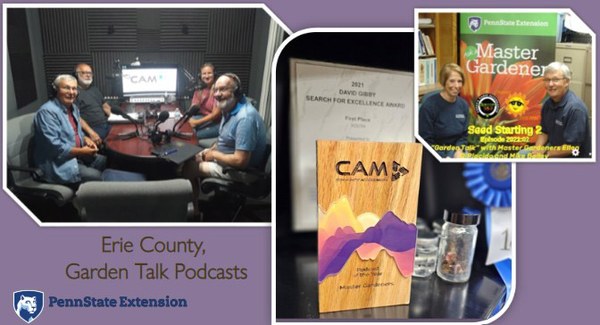
Demonstration Garden—Westmoreland County:
Daylily Deer Fencing
The Daylily Garden is part of the Donohoe Demonstration Garden, located in Greensburg, Pennsylvania. There are different garden areas that Master Gardeners maintain to share with the community in Westmoreland County. After the pandemic, two Master Gardeners became involved with rejuvenating the daylily plot, which the deer had been using as a bedding area. The Daylily Garden is about 200 square feet. Increasing deer pressure over the past few gardening seasons led us to investigate options for protecting the daylilies through nonchemical means. We determined that a physical deterrent was needed and installed a fishing line deer fence in the spring of 2023
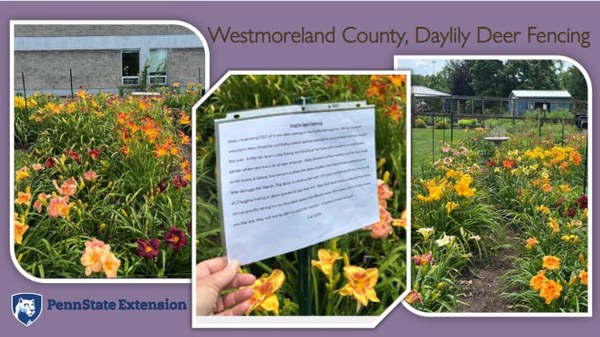
Innovative Project—Centre County:
POLLINATORS! The Musical
POLLINATORS! is a musical theater presentation designed to teach critical concepts of pollinator behavior and life cycles in an entertaining, memorable, and accessible way. Combining humor, music, and science, it appeals to all ages, fostering appreciation for pollinators. Performances have been featured at family-friendly events, school festivals, and conferences, including Penn State's International Conference for Pollinator Health. Partner organizations, such as Penn State's Center for Pollinator Research, support this flexible and impactful educational program.
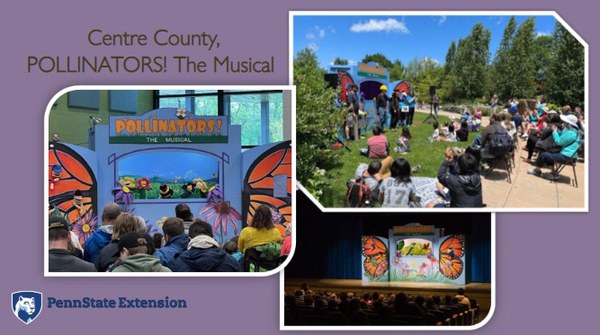
Presentations and Workshop— Elk and Cameron Counties:
Seeds of Knowledge, Presentation Outreach Campaign
The Penn State Master Gardener Program aims to educate and inspire home gardeners, community members, trainees, and Master Gardeners through workshops, presentations, and informational materials. The program promotes self-sufficiency, food security, and climate awareness. Activities were held in Elk, Cameron, and McKean Counties at libraries, markets, fairs, and community events, with support from local organizations like the Elk County Conservation District and the Western Pennsylvania Conservancy.
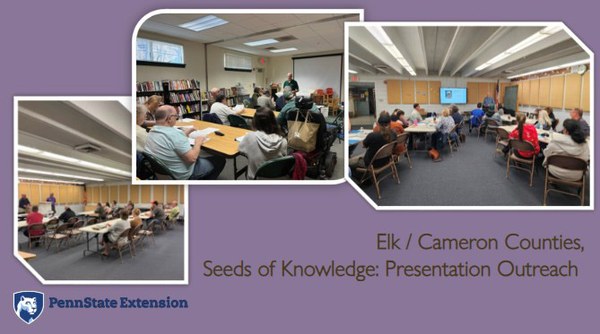
Special Needs Audience—Erie County:
Club Erie Participation at BEST Garden
The Penn State Master Gardeners of Erie County partnered with Club Erie, a program of the Gertrude Barber Center, to teach adults with intellectual disabilities the basics of vegetable and flower gardening in a social, supportive environment. During weekly meetings, participants plant, maintain, and harvest produce from raised beds, gaining skills and confidence. The program also includes pollinator gardening and growing plants from seed. Many members return annually and start gardens at home, fostering independence and community connection.
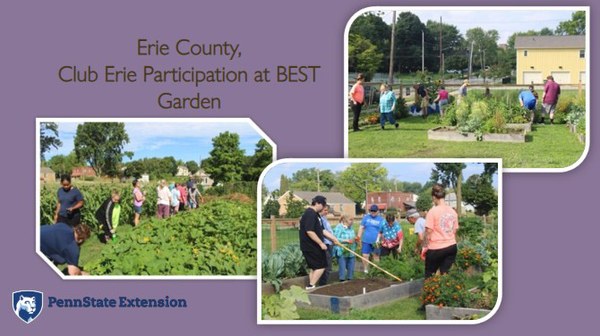
Youth Programming—Westmoreland County:
Formula for Success: Poison Prevention Program
The Poison Prevention Program targeted first-grade students in Westmoreland County, aiming to educate them on preventing poisonings at home through engaging, 30-minute classroom presentations. A team of Penn State Master Gardeners delivered 123 presentations across 37 schools in 16 districts, reaching 2,198 students. Success relied on early planning, clear communication, goal setting, training, and teamwork. Partnerships with schools ensured optimal scheduling, while "Mr. Yuk" branding enhanced visibility. Team bonding events, like a "packet party," added fun to the process.

Home Garden News
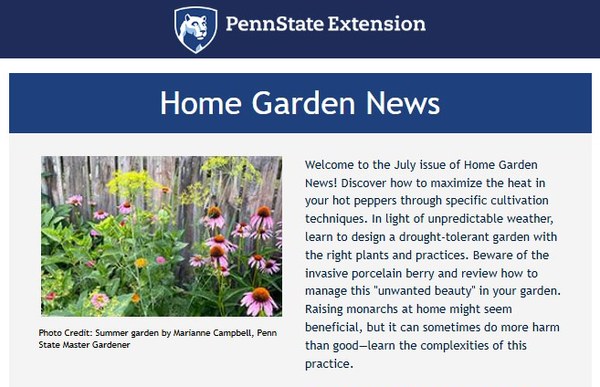
The Penn State Extension Master Gardener Program continues to empower gardeners with the monthly Home Garden News digital newsletter. Tailored for gardening enthusiasts of all levels, this publication serves as a treasure trove of practical advice, seasonal tips, and expert knowledge to help gardeners thrive throughout the year.
Each edition of the newsletter features timely articles written by volunteers and extension educators. From cultivating pollinator-friendly habitats to managing common pests, the content is designed to address the challenges and opportunities that come with each growing season. Additionally, readers can find updates on upcoming workshops, webinars, and community gardening events hosted by Penn State Extension.
One of the standout features of Home Garden News is its commitment to sustainable gardening practices. Topics such as vegetables, weed identification, ecological gardening, soil health, and gardening techniques are routinely highlighted, aligning with our program's mission to promote environmentally responsible practices.
The digital format makes it easy for readers to access resources anytime and anywhere, while hyperlinks within articles provide direct access to additional information and extension publications. Subscribers also appreciate the vibrant photographs and engaging visuals that bring gardening topics to life.
Whether you are a seasoned gardener or just starting your first backyard plot, the Home Garden News newsletter is an indispensable guide to making the most of your gardening journey. To subscribe, visit the extension website at extension.psu.edu or scan the code here and join a growing community of passionate gardeners dedicated to cultivating beautiful and productive spaces.
A Fresh Look at Garden Hotline Outreach
Answering garden questions from the public is the cornerstone of the Master Gardener Program. Over 50 years ago, plant science researchers at Washington State University were overwhelmed with garden questions from the general public. To stem the flood, they trained community volunteers in the basic principles of horticultural science to help answer most of the questions. In 1972, this group was formally organized into the very first Master Gardener Program.
At Penn State, Garden Hotline services are primarily provided through two methods. For our traditional Garden Hotline, members of the public can contact their local county extension office via email, phone, and walk-ins, and volunteers will work with them to answer their questions. As an alternative, we also answer thousands of questions each year at "Ask a Master Gardener" booths at public events like fairs, expos, and other community gatherings. These interactions tend to be more informal but capture those who might not otherwise reach out to their local extension office.
In 2024, volunteers answered 33,505 questions through the traditional Garden Hotline, a 14.5% increase from 2023. However, when including data from outreach events, the final number was staggering: 73,519 questions answered! By meeting the public where they are, we are more than doubling the amount of science-based information that we provide to Pennsylvanians.
Overall, with warmer and more unpredictable weather, people everywhere have seen a sharp increase in challenges to plant health, leading to a higher demand for real-time information. It would cost Penn State over $625,000* to hire staff to replace the Garden Hotline services provided by volunteers. In a time of high labor costs, fewer faculty appointments, and shrinking University budgets, this contribution is critical for providing the public with high-quality, time-sensitive responses to plant health questions.
*19,973.2 hours volunteered answering questions from the public valued at $31.30 per hour (the hourly value of volunteer time in Pennsylvania).
| Category | Garden Hotline | Outreach Events | Total |
|---|---|---|---|
| Spotted Lanternfly | 1128 | 9921 | 11,049 |
| Referrals, Upcoming Events and General Program Info | 1802 | 4771 | 6,573 |
| Insect (Indoor and Outdoor) Samples Sent to Penn State for ID | 73 | 36 | 109 |
| Insect (Indoor and Outdoor) Questions Answered Directly | 2,130 | 2,287 | 4,417 |
| Wildlife and Animals | 1,677 | 2,817 | 4,494 |
| Weed and Invasive ID and Management | 2,449 | 2,398 | 4,847 |
| Soil Health (Soil Testing, Composting, Mulching) | 2,545 | 2,421 | 4,996 |
| Site, Weather-related, or Cultural Problem | 2,126 | 1,106 | 3,232 |
| Plant ID | 4,008 | 3,334 | 7,342 |
| Plant Culture, Care, and Pruning (Includes Turfgrass) | 6,051 | 3,313 | 9,364 |
| Garden Planning, Plan Selection, Plant Propagation | 6,617 | 6,418 | 13,035 |
| Disease Questions or Samples Sent to the Plant Disease Clinic | 205 | 26 | 231 |
| Disease Questions Answered Directly | 2,694 | 1,166 | 3,860 |
| Total | 33,505 | 40,014 | 73,519 |
New data this year include questions answered at public outreach events. Credit: Erin Kinley
Bee Monitoring Project 2024
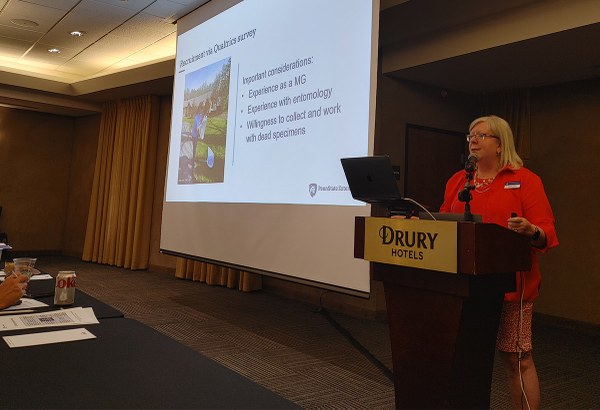
Area Coordinator Valerie Sesler presents on the nationally recognized Bee Monitoring Program at the National Extension Master Gardener Coordinators Conference in New Mexico in August 2024. Photo Credit: Erin Kinley
Bees are the most important pollinators of flowering plants in natural, agricultural, and urban habitats and are critical for their ecological function and long-term sustainability. The decline of bee populations worldwide has highlighted the need to better understand wild bee pollinator diversity, distribution, and abundance. A recent study from the López-Uribe lab updated the number of species reported in Pennsylvania to 437, providing the first step to understanding the state's regional bee diversity. However, the status of wild bee populations in Pennsylvania (whether they are stable, declining, or increasing) is unknown.
The Master Gardener Program and the López-Uribe lab collaborated to create an educational opportunity for volunteers to leverage their knowledge and interest in pollinator natural history by training them in bee identification, curation, and sampling protocols. This project offered advanced training to 20 Master Gardeners who were chosen to represent specific counties lacking data through a series of webinars and hands-on field days before project participants independently led field collections. The Bee Monitoring project team planned to use the data collected by participants to gain better knowledge about the diversity and distribution of wild bees in Pennsylvania. Now in its third year, the initiative has become a state bee monitoring program and has been used to collect longitudinal data to identify changes in bee species distribution, diversity, and abundance.
In 2023, the project collected 9,058 bee specimens that were identified to the species level for a total of 243 species from 38 genera collected from 31 counties (Figure 1). In addition, they detected two new non-native bees as state records, Chelostoma campanularum and Heriades truncorum, which both belong to the family Megachilidae.
The Bee Monitoring project was originally made possible by a Science-to-Practice (S2P) grant awarded by the Penn State College of Agricultural Sciences Office for Research and Graduate Education and Penn State Extension.
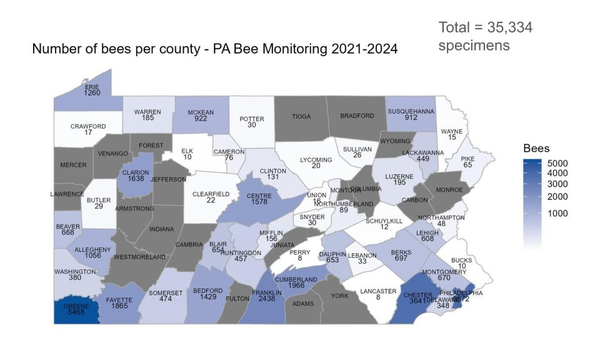
Map of Pennsylvania showing the number of Bees Collected per county in 2021-2024 by the Master Gardeners participating in this project
Total=35,334 specimens
title: Number of bees per county - PA Bee Monitoring 2021-2024
